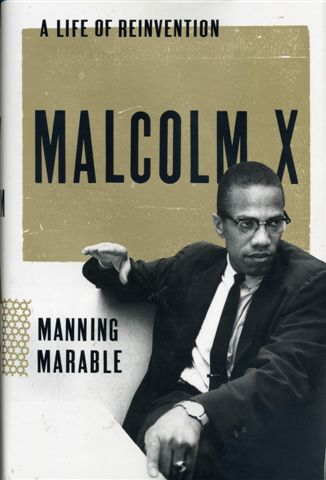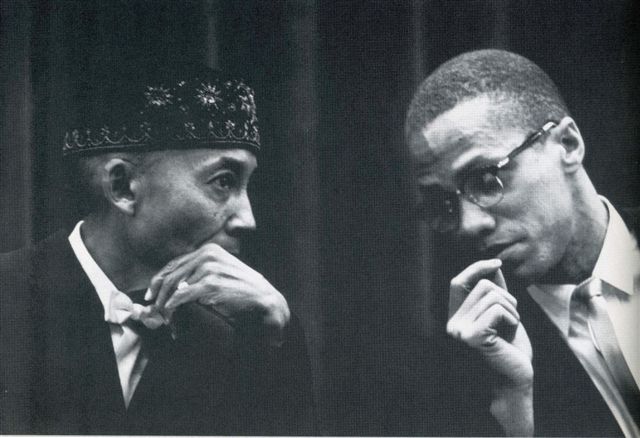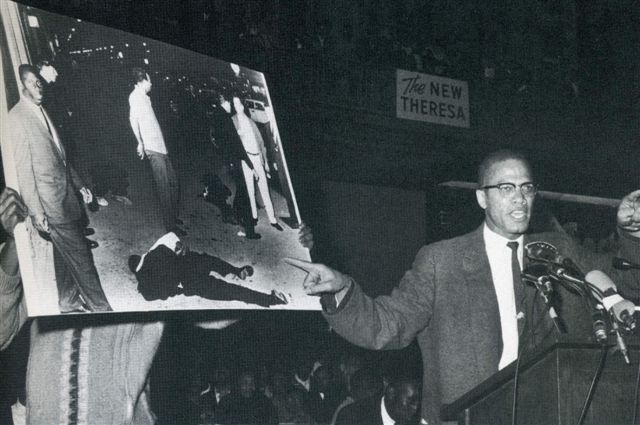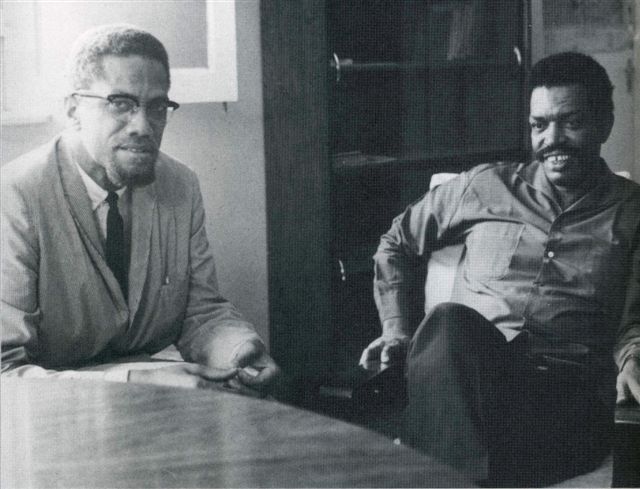MALCOLM X: A LIFE OF REINVENTION
By MANNING MARABLE
A Look at the Book
Special by THE NEW TIMES HOLLER!
FROM THE BUREAU OF X-PONENTIAL POTENTIALS REALIZED by
© Amir Bey, 2011
MAY 19
|
Manning Marable?s MALCOLM X A LIFE OF REINVENTION stands to be the most thoroughly researched book on Malcolm now written. Marable began his twenty year endeavor when he felt that Malcolm's Autobiography had inconsistencies and parts that Malcolm may have fictionalized to illustrate certain points.
He felt that it lacked an adequate account of Malcolm?s rapid evolution in the last few years of his life, particularly the foundation of his two groups after splitting with Muhammad: the MMI (Muslim Mosque Incorporated) and the AAOU (Afro American Organization of Unity). Marable also felt that Alex Haley, who by his own admission was less a collaborator and more a recorder
and editor for the Autobiography, may have influenced its slant after Malcolm?s death by being a Republican integrationist.
MALCOLM RE-INTRODUCED

|
|
Other than addressing the perceived shortcomings of the Autobiography, what makes Reinvention a more complete study of Malcolm than previous ones is the source materials and the time that was invested in its making. The bibliography is huge, including Malcolm?s detailed diaries, which were not available to scholars until 2008; letters to Elijah Muhammad, some of them deeply personal, where he discusses tensions with his wife Betty; interviews and oral histories with former close aides, and FBI and New York City police intelligence (Bureau of Special Services and Investigations (BOSS) agents and documents; letters and statements from his brothers, Farrakhan, court documents, and many other sources.
Marable passed away days before Reinvention was released from a chronic pulmonary ailment. This is a well-crafted oeuvre from a prolific historian. The Autobiography will remain a classic of African American literature; Reinvention will become an important reference to the life of one of the most complex individuals of 20th Century America. Not only that: it is also a well-structured testimony of the complex group of forces arrayed against him, the NOI (Nation of Islam); FBI; CIA; BOSS; and other government agencies and interests who through lack of a true understanding of Malcolm, as well as real fear would not be comfortable until he was dead.
Reinvention causes one to ask whether any autobiography could be honest or truly objective. An autobiography is like an individual's signature: it indicates the way its writer presents an idea of who they are, and how they would like other?s to see them. The Autobiography chose certain aspects of Malcolm?s life, emphasizing some, obscuring or slanting others. According to Marable, he exaggerated his hustler period, and when he and his crew were finally arrested, it was due to his negligence. Reinvention?s view his early years emphasizes his instability and selfishness, creating a stronger contrast than the Autobiography does concerning his transformation after joining the Nation. Malcolm was a disaffected, essentially orphaned youth who was denied opportunities (he was told there are no nigger lawyers when he expressed an interest in being one) who became a petty hustler.
Malcolm always had a ?gift of gab?; he was blessed with verbal ability. He developed his Lindy Hop skills and sometimes danced under the name Jack Carleton. He created a false worldliness to impress his siblings, stole from them, was not to be trusted. He was a dramatically different person than the profoundly dedicated self-sacrificing minister he came to be. Until he was incarcerated, he explored quick ways to attain an easy manhood, like many rootless young men-children. After his incarceration, he focused on developing his gift of gab into a powerful tool that was fashioned by a disciplined mind.
|

photo: Eve Arnold, Magnum Photos
The Honorable Elijah Muhammad and Malcolm before the split.
Marable makes a key observation about Malcolm's character and sets the stage for his split with NOI by describing him as an artist who reinvented himself throughout his life. He cites some of Malcolm?s various names: Detroit Red, Homeboy, Satan, Jack Carleton, and Malik Shabazz. Being an artist explains one aspect of the split: Malcolm was someone who had an acute need to express his individuality, to be active, to challenge. He was not a conformist, which was necessary in being a member of the NOI.
|
|

photo Bettman/Corbis
Malcolm at a rally for Ronald Stokes, a NOI member who was murdered by LA police, 1962. The NOI's weak response disappointed Malcolm, and was one factor in his disenchantment with the NOI.
The NOI was not only too confining for him temperamentally: its responses to the abuses of black people's human rights were too "tepid," for Malcolm, in Marable's estimation. And he became aware that the NOI's practice of not being involved in demonstrations and voting put the Nation out of touch with the majority of blacks who wanted to directly confront issues. Marable shows how even though Malcolm had these frustrations, he was dedicated to the Nation, and always acknowledged his indebtedness to "The Messenger". He worked tirelessly for the Nation, and was the NOI's point man to the outside world. This kind of attention made Elijah's sons Herbert and Elijah Jr., and son-in-law Raymond Sharrieff nervous about whether Malcolm planned to succeed The Messenger after his passing. It can't be known if Malcolm ever entertained that idea; but after reading Reinvention one has the impression that initially Malcolm may not have fully recognized his personal ambitions, that he had the capability and the desire to lead. He was aware of the affect of his leadership to the benefit of the Nation: he energetically built new mosques in major cities around the US, and he spread the NOI's word in the media. It seems that he saw himself more as a faithful "son" to Elijah's father, and was highly motivated to dedicate himself to that entity and the Nation?s cause.
|
Malcolm's flaws are honestly discussed, including those that were fatal: his honesty and the trust he placed in others who later became his rivals and who wanted his destruction. It was impossible for him to wage the kind of war that eventually was waged against him. In this there was ambivalence; he would make statements against the Nation then retract them;
and such shifting of positions also occurred when he would attack Martin Luther King and other "Uncle Tom Leaders," then would appear to accept them at other times. In some instances, the split wasn't entirely the fault of those within the Nation who were envious of him.
When Elijah ordered all ministers not to comment on JFK's death, Malcolm not only commented, but pushed the envelope further, enraging the hierarchy. This conflicted tendency to exacerbate his troubles with the Nation showed itself many times during that period. He could not fully bite through the bond he was trying to break while attempting to create a new foundation to replace the Nation.
|
|

photo Bettman/Corbis
Malcolm with Abdulrahman Muhammad Babu, leader of the Zanzibar Revolution, 1964. Malcolm felt that the African American situation was a human rights issue, not a US domestic issue, and should be brought before the UN in that context.
By viewing Malcolm's diaries that documented his travels, combined with media and government accounts of them, we can see his international threat to the NOI: he was developing ties with Muslim countries and institutions that had long had trouble with the Nation's brand of Islam, and were offended by Elijah's claim to be "The Messenger." They accepted Malcolm as a true Muslim, and gave recognition to the MMI, granting 20 scholarships to members of his organization to study Islam in those countries. For the NOI this was another reason why Malcolm had to go, because he was acquiring the legitimacy from the countries and religious institutions that they were seeking. Another sore point was Malcolm's perceived influence and bonding with Elijah's sons Wallace D. Muhammad and Akbar, who also practiced orthodox Islam, and who had troubles with their father's affairs and children by young girls.
The government was also threatened by Malcolm's call for taking the plight of African American people to the UN, calling for their plight to be addressed as a human rights issue instead of civil rights. Reinvention shows how the FBI was at first alarmed by the Nation's power, and how it gradually exploited the growing rift between Elijah, the NOI hierarchy and Malcolm. It describes how the Nation and Malcolm's organizations were compromised by being heavily infiltrated by the FBI, BOSS, the CIA, and other intelligence agencies.
Marable draws profound distinctions between King and Malcolm and cites those differences to illustrate why if Malcolm were alive today he would not seek office or have been an integrationist as some have speculated; instead he is viewed as becoming an internationalist who would have valued and maintained his identity "as a black man, a person of African descent who happened to be an American citizen." (Page 482)
Reinvention's weaving of the Malcolm's assassination, like all reconstructions of it, is difficult reading; one of its most tragic aspects was its being a filicide: the father killed his son. Malcolm was Elijah's heir, not because he would have inherited a throne, but because Elijah led him on the way to creating a great spiritual and secular institution. It can be argued that Elijah?s legacy would have been greater if Malcolm had not been assassinated. In Marable?s presentation, Malcolm again swung between fighting and at times, pleading blacks should not be killing each other. Several times he said he would be killed. The pressure of living under the near certainty of death by your ?father? and the institution that Malcolm helped to build was overwhelming.
Marable leaves no doubt that the assassination was carried out by a NOI manipulated by various government agencies who had infiltrated key positions in the NOI, and Malcolm's organizations, the MMI and OAAU. These government agencies did not work together, and even mistrusted each other. Yet they had a common goal, and used the NOI as their weapon. If only... if only the father had protected his "wayward" son...
Marable describes how government agencies knew that Malcolm had decided not to frisk people on February 21, and that only two of his bodyguards would be armed. This information was passed onto his assassins, and was coordinated by individuals within his organization. And it is well known that the NYPD were understaffed for that day, and slow in getting to the crime scene. One act that would have been unconscionable if it wasn't deliberate, was the manager/owners of the Audubon Ballroom where he was killed, had booked the same room for a George Washington birthday dance. The police did not protect the crime scene, but allowed the celebration to be held. The custodians mopped up Malcolm's blood, moved the chairs, thus making any reconstruction of the assassination impossible.
It?s unfortunate that Manning Marable did not live to see this important work published, and to respond to its detractors, some of whom feel that Malcolm's memory has been sullied by it, that this icon has been done a disservice by revealing his private, human side. This is not true; it humanizes the brother, and from what those who were close to him have said, he might have appreciated it.
While Reinvention makes Malcolm more human, he shall remain iconic nevertheless. It can be said that Malcolm?s story is one of the most dramatic in American history: his is what myths are made of. To capture his life, careful research such as Reinvention is required
along with the skills of a story-teller who can evoke the power, majesty and anguish of ?Our Black Shining Prince.? However, symbols speak louder than pictures: even detailed revelations will merely add to his mythos, and in time his story will become an (the?) American Passion Play. As with Anthony Davis?s Operetta ?X, The Life and Times of Malcolm X?, classic elements of a great legend are in it: the early death and inspiring influence of his father, the institutionalization of his mother, and the resulting disintegration of his family; his life of petty crime, incarceration, and the salvation through a new spiritual father-king; his battle with American society at large as well as for the souls of black folk; the father-king's fear of him,
and the envy of the father-king's princes; the plotting of the larger forces circling around him, tightening the noose closer; his death and powerful legacy. Our ideas of history and individuality ask us to go beyond idolizing him, but our wonder at his life and how he shook things up continue to strike us. To mythologize is to be human?
Editorial decisions by the publishers may be to blame, but the selected illustrations are not on the same level as the text. There are twelve pages of photos, yet these do not adequately portray or highlight many of the major individuals discussed, or they include images of people who had less relevance than others. A case in point is photographs of the two ?assassins? who were said to be wrongly accused, but Talmadge Hayer, the one assassin who admitted being a conspirator, and who was wounded at the scene, was not included. Better selections would have helped this complex narrative.
To see an astrological interpretation of Malcolm's chart, visit An Astrological Profile of Malcolm X, by Amir Bey.
For a great collection of photos of Malcolm, see Malcolm X: The Great Photographs, text by Thulani Davis, edited by Howard Chapnick, Stewart, Tabori and Chang, 1993; it's out of print but search and ye shall find! Below are three examples.
|
|
|
|
|